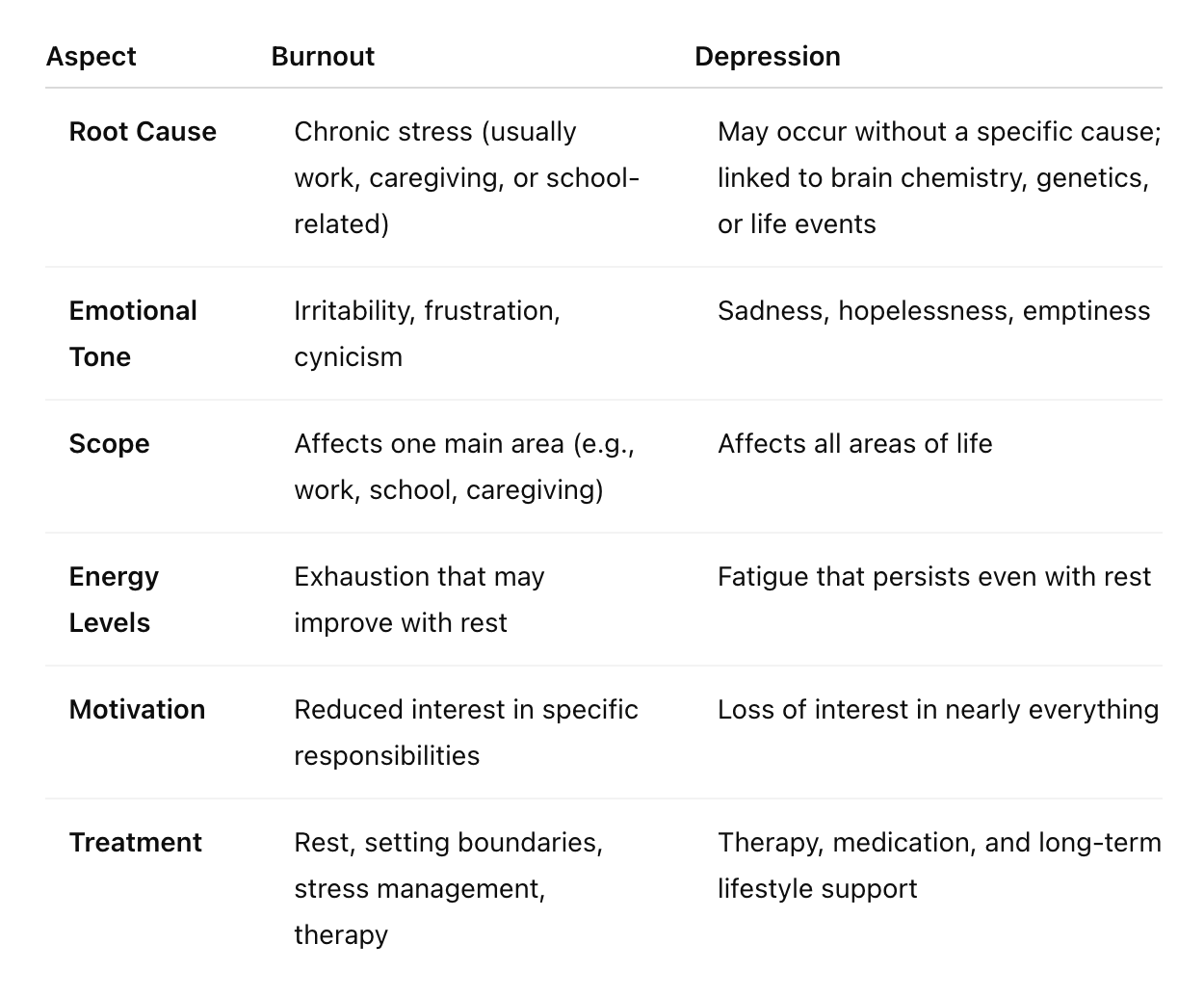Burnout or Depression? How to Tell the Difference and When It’s Time to Get Help
A free resource provided by: Psychology House - Tampa, FL
FAQs: Quick Answers
-
Burnout is typically caused by chronic stress related to work, caregiving, or overwhelming responsibilities. It usually affects one area of your life and may improve with rest or lifestyle changes. Depression, however, is a clinical condition that affects all aspects of life, often without a clear trigger, and requires professional treatment to recover.
-
Yes. If burnout goes untreated, the constant emotional and physical stress can evolve into depression. That’s why it’s important to take symptoms of burnout seriously and seek help early.
-
If you’re constantly exhausted, feeling detached from your work or responsibilities, and struggling to find motivation even after rest, therapy can help. A therapist can guide you in identifying triggers, setting boundaries, managing stress, and rebuilding balance.
-
If you’re feeling persistent sadness, hopelessness, or emptiness for more than two weeks, and nothing seems to lift your mood, you may be experiencing depression. Other signs include appetite changes, difficulty sleeping, and a loss of interest in activities you used to enjoy.
-
Evidence-based approaches such as Cognitive Behavioral Therapy (CBT), Acceptance and Commitment Therapy (ACT), and mindfulness-based techniques are highly effective for both burnout and depression. These methods help you manage negative thought patterns, set boundaries, and regain a sense of purpose.
Introduction
You wake up every day feeling drained. Work feels impossible, motivation is gone, and even weekends don’t seem to recharge you anymore. You might wonder—is this just burnout, or could it be depression? The truth is, these two experiences often overlap, which can make it hard to tell them apart. Both can leave you feeling exhausted, detached, and unmotivated. But understanding the difference between burnout and depression can help you take the right steps toward breathing life back into your days.
In this article, we’ll explore what sets burnout apart from depression, how to recognize the signs of each, and when it might be time to reach out for professional help. We’ll also share how therapy has supported our Tampa clients in recovering their energy, focus, and sense of well-being.
Why Burnout and Depression Are So Easily Confused
Both burnout and depression can make you feel mentally and physically drained, less motivated, and emotionally disconnected from the things you care about. That’s because they share several overlapping symptoms: fatigue, irritability, poor concentration, and a loss of interest or joy.
The biggest difference lies in what causes them and how far-reaching they are. Burnout usually stems from chronic stress—often work-related or connected to caregiving, school, or overwhelming responsibilities. It tends to affect one main area of your life. Depression, on the other hand, doesn’t always have a clear trigger and impacts nearly every part of your daily functioning, from sleep and appetite to your ability to experience pleasure.
It’s also worth noting that untreated burnout can turn into depression over time. That’s why it’s so important to recognize the early signs and take action before things get worse.
Understanding Burnout
Burnout isn’t just being tired or overworked—it’s a state of emotional, mental, and physical exhaustion caused by prolonged stress. The World Health Organization recognizes burnout as an "occupational phenomenon" rather than a medical diagnosis, but that doesn’t mean it’s not serious.
Common causes of burnout include:
High workload or chronic stress at work
Lack of work-life balance
Caregiver fatigue or emotional strain from supporting others
Feeling under appreciated or powerless
In Tampa, many professionals, teachers, and healthcare workers experience burnout due to high demands and fast-paced work environments. Parents and students can also face it—especially those juggling multiple roles or responsibilities.
Signs you may be experiencing burnout:
Emotional exhaustion or detachment
Feeling cynical or negative about work or responsibilities
Reduced performance or productivity
Difficulty concentrating
Sleep issues or physical fatigue
Irritability or frustration
The hallmark of burnout is that it’s often tied to a specific situation or role. You may still feel enjoyment or motivation in other areas of your life—just not in the one that’s causing you stress.
Understanding Depression
Depression is a clinical mental health condition that goes beyond situational stress. It affects your mood, thoughts, energy, and physical health—and it doesn’t always have a clear cause.
While burnout typically improves when you rest or change your environment, depression tends to persist even when circumstances improve.
Common symptoms of depression include:
Persistent sadness or emptiness
Loss of interest in activities once enjoyed
Significant changes in appetite or weight
Trouble sleeping or sleeping too much
Feelings of guilt, hopelessness, or worthlessness
Difficulty concentrating or making decisions
Low energy or fatigue
Thoughts of death or suicide (if this applies, please call 988 immediately for the Suicide and Crisis Lifeline)
At Psychology House, our licensed psychologists in Tampa often see clients who initially believe they’re just burned out. But through therapy, it sometimes becomes clear that what they’re experiencing aligns more with depression—or even a combination of both.
Burnout vs Depression: Key Differences
The chart below shows a side-by-side look at how burnout and depression differ:
It’s also possible to experience both burnout and depression at the same time—especially if chronic stress has gone unaddressed for too long.
When to Seek Professional Help
Recognizing when it’s time to reach out for help can be difficult, especially when you’re used to pushing through tough times. But both burnout and depression deserve attention and care.
When to See a Therapist for Burnout
You feel emotionally drained most days and can’t recharge, even after rest.
Work or daily responsibilities fill you with dread or frustration.
Your stress is affecting relationships or your health.
You’re struggling to set boundaries or say no.
Therapy can help you process stress, build coping tools, and create healthier boundaries so that you can restore balance to your life. At Psychology House, we work with clients in Tampa who are ready to reduce stress and find sustainable ways to recover from burnout.
When to See a Therapist for Depression
Feelings of sadness, emptiness, or hopelessness last more than two weeks.
You’ve lost interest in activities that used to bring you joy.
You’re struggling with sleep, appetite, or energy.
You’re withdrawing from friends and family.
You’re having thoughts of self-harm or hopelessness.
Depression is highly treatable. Evidence-based therapies such as Cognitive Behavioral Therapy (CBT), Acceptance and Commitment Therapy (ACT), and mindfulness-based interventions can help you manage negative thoughts, build resilience, and regain a sense of purpose.
If you’re in the Tampa area, reaching out to a licensed psychologist at Psychology House can be the first step toward recovery. We’ll help you identify what you’re experiencing and work together on a personalized plan for healing.
If you’re in crisis or having thoughts of self-harm, call or text 988 for the Suicide and Crisis Lifeline, or go to your nearest emergency department.
Treatment Options and Hope for Recovery
Both burnout and depression can make you feel trapped, but recovery is absolutely possible with the right support. Therapy helps you learn coping skills, reframe negative thoughts, and find new ways to manage stress.
For burnout, therapy may focus on identifying triggers, improving work-life balance, and developing self-care routines. For depression, evidence-based treatments can help regulate mood, challenge unhelpful thoughts, and rebuild motivation.
At Psychology House, our Tampa-based clinicians provide a supportive environment where clients can talk openly about their struggles and rediscover hope. Many people who start therapy feeling drained or hopeless often find themselves experiencing joy and balance again within a few months.
Conclusion
It’s easy to confuse burnout with depression—especially when you’re feeling tired, unmotivated, or emotionally numb. But knowing the difference can make all the difference in how you heal.
Whether your exhaustion stems from stress, depression, or both, talking with a licensed therapist can help you get clarity and start feeling better. If you’re in Tampa, our team at Psychology House is here to help you take that first step toward recovery.
Ready to feel like yourself again? Contact Psychology House today to schedule a consultation.
About Psychology House - Tampa
We know therapy can be challenging. The most important things always are. But we also know it can be transformative. We see it in our clients, their family lives, relationships, and in their careers. Located in South Tampa, Psychology House is home to highly trained psychologists who specialize in today’s most prominent mental health issues and evidence-based treatments. Prioritizing comfort, safety, and connection, we’ve cultivated a psychology practice built on the idea of home.
Psychology House provides both in-person therapy (Tampa, FL residents) and virtual sessions (Florida Residents/PsyPact States). Our growing team of psychologists specialize in depression, trauma/PTSD, anxiety, relationship issues, addiction, and more.


